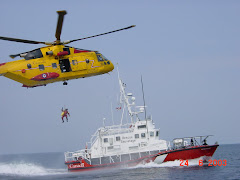Whelp paraphase is pretty much done. I don't think it could've been more eventful if we tried and I assure you we didn't. After returning from Arizona where we did our first static line jumps followed by 3 weeks of freefall (w00t!), we are now getting into the bread and butter of SAR Tech parachuting..... confined areas. A confined area is pretty much a small area (like half the size of a soccer field) surrounded on all sides by 200ft trees. If you're a skydiver and you think "no big deal" WRONG. It's totally different than any other sort of parachuting. Think about this. Static line jump from 1500ft, with a bush suit to protect you (orange suit in picture), tree let down device in case you get hung up in a tree (which is a very real possibility), SAR PELS (black pouch on front of jumper) filled with whatever you may need (clothing, medical kit, etc...) and then an approach into a confined area where you don't know which was the wind is blowing. And that's just training. Operationally you get dropped from 1000ft and there are no wind limits.
We've made some history by having the first ever hung-up SAR Tech. Meaning we were doing an intentional water jump into Comox lake in our drysuits and one of the guys got hung up (re:DRAGGED) out the back of the aircraft. He made the proper signal that he was conscious and was subsequently cut away. His reserve had some difficulty opening and did not fully develop. Thankfully we were over water since he still hit the lake hard enough to sustain some injury. If it was over ground he might not be jumping anymore.
We've also had a jumper land in a tree. It's quite a sight to see someone parachute into a tree. Thankfully his canopy got anchored in some branches about 150ft up. He kept his composure and did his tree let down procedure and all was well. Unfortunately when a Cormorant helicopter was sent the following day to retrieve the parachute, the downwash blew over someone's shed in the nearby vicinity.
As it stands now we jump until the end of the week and then on Saturday we head to Jasper to start mountain ops for 2 weeks. Immediately after that we proceed to Jarvis lake to conduct final ops. Final ops is the culmination of our training for the last year. We'll be searching from air and ground, parachuting, diving, extracting, and of course providing medical aid to the many casualties we are sure to find.

